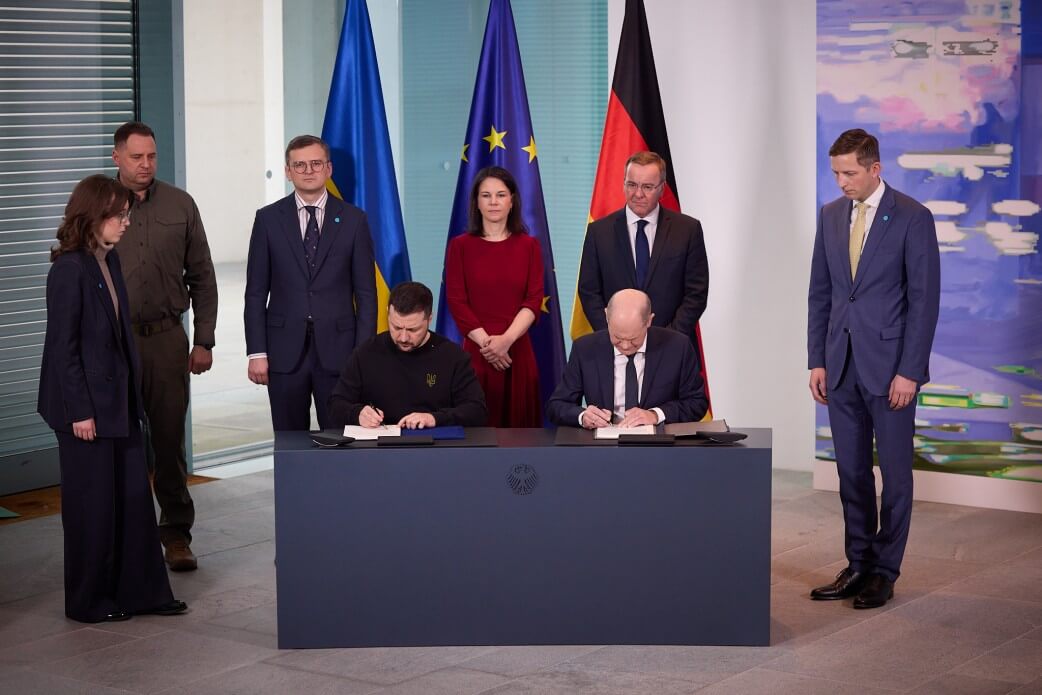This year's Munich Security Conference did not have a shared annual topic, perhaps resulting from the global turmoil where highlighting one issue above the others would damage the conference's reputation.
Despite this, the 60th Munich Conference will be remembered by a whole series of events in its orbit in a short time that had the potential to shape global security for a very long time.
This year's Munich Conference could be remembered for being at the epicentre of a shift towards resolving at least one globally significant conflict - one in Ukraine.
Before the conference, the hosts prepared a rather pessimistic-toned report on the state of global security entitled "Lose-lose?"
“Pessimism has crowded out the optimism of the early post-Cold War era. Amid increasing geopolitical rivalry and a global economic slowdown, key actors in the transatlantic community, in powerful autocracies, and in the so-called Global South have become dissatisfied with what they perceive to be an unequal distribution of the absolute benefits of the international order,” stated the 2024 Munich Security Report.
Dramatic warnings of approaching war
This conclusion is quite objective, even though gloomy, but we must bear in mind that it was made before the MSC, and it could not be updated with some new moments, which would significantly affect its content.
This year's MSC started in an environment of strong and frequent warnings regarding Russia's possible attack on one of the European NATO members. The controversy regarded only the timing of the attack.
"The West should prepare for an all-out war with Russia in the next 20 years" - Adm. Rob Bauer
Dutch Admiral Rob Bauer, NATO Military Committee chief, said last January that the West should prepare for an all-out war with Russia in the next 20 years.
In his first speech as UK Defence Secretary, Grant Shapps called for preparations for future wars involving China, Russia, Iran and North Korea in the next 5 years.
General Sir Patrick Sanders, the UK's Army Chief, spoke in the same tone about the current generation of Britons as the "pre-war generation", who would have to prepare for war.
Polish Defence Minister Władysław Kosiniak-Kamysz said in early February that his country must urgently prepare for the threat of war with Russia.
Have Europe and the US snapped out of lethargy?
The wave of alarming warnings from European political and military leaders has been a sobering reaction to the sharp decline in public interest across Europe regarding the fate of Ukraine and its defence against Russian aggression.
In a report, the Munich Security Conference stated that “almost all indicators related to Russia’s war on Ukraine have fallen, including the use of nuclear weapons by an aggressor and energy supply disruptions”.
“While Russia was still the top risk for five G7 countries last year, only the citizens of the UK and Japan still consider it so. German citizens now only see Russia as the seventh greatest concern and Italians see it as the 12th. Other prominent risks have fallen, too,” was the result of this year's MSC Index.
However, what the conference hosts could not include in the preparation and which could have significantly changed the pessimistic findings were Donald Trump's statements. He stated that the US, under his presidency, would not defend its European allies if they were attacked by Russia.
Trump’s appalling encouragement of Putin to attack any European ally of the US, which does not meet its financial obligations to NATO, might be a factor that could change the weakened attitude of Western partners towards support for Ukraine.
 Ukraine has never had a more valuable and stronger document than the document we signed today - Volodymyr Zelensky
Ukraine has never had a more valuable and stronger document than the document we signed today - Volodymyr Zelensky
Trump's words will undoubtedly affect the unfreezing of financial and military aid to Ukraine, which was almost hopelessly stuck in the US Congress. His statement has so far been the most severe sobering up regarding where US politics could lead if he gets a new presidential mandate.
At the Munich Forum, as a response to the ominous announcements from the US, the agreement between Germany and Ukraine on long-term security guarantees was signed.
Germany is the second member of the G7, after the UK, to implement the organisation's decision from last July, providing Ukraine with protection against a future attack by Russia.
“Ukraine has never had a more valuable and stronger document than the document we signed today,” said President of Ukraine Volodymyr Zelensky after signing the agreement with Chancellor Olaf Scholz in Munich last Friday.
Putin's "holy place" or a negative turning point
Finally, the death of Alexei Navalny in a Russian prison, which happened on the first day of the Munich Conference, and particularly the poignant and defiant address to the participants of the forum by his wife Yulia, put before the leaders the obligation to wake up and intensify engagement against the Russian threat.
“In the annals of international meetings, it would be hard to remember a more riveting moment, when the careful scripts of government leaders laden with diplomatic jargon fall to the wayside as life-and-death questions play out so intensely in front of them,” wrote Peter Baker from The New York Times on X about that scene.
This year's Munich meeting might mark a downward shift for Putin and a prelude to the final collapse of his aggressive policies
The Munich Conference is one of the "holy places" for Vladimir Putin, because in 2007 he clearly hinted at what would become his war against the West years later.
Unfortunately, few understood his famous speech at the time (and even later) as the most open possible threat and a promise that he would fulfil with subsequent aggressions against Georgia, then Ukraine, and now with threats to the whole of Europe.
This year's Munich meeting might mark a downward shift for him and a prelude to the final collapse of his aggressive policies.